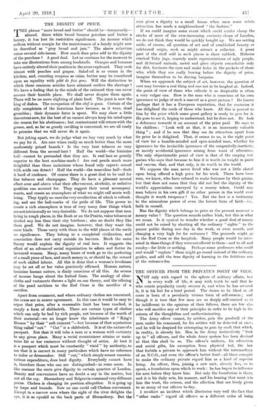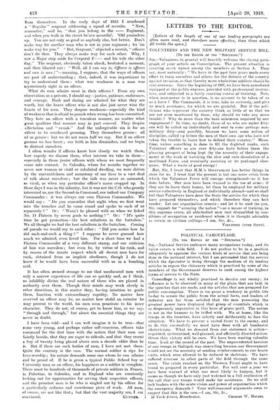THE OFFICER FROM THE PRIVATE'S POINT OF VIEW.
NOT only with regard to the sphere of military affairs, but in every walk of life, it may with truth be said that he who courts popularity rarely secures it, and when he has secured it, it is his but for a brief period. The desire to be liked at all costs is born of a peculiarly vicious form of self-esteem ; and though it is true that few men are so deeply self-centred as to be indifferent to the opinions of their fellows, there are few also who will sacrifice any of their principles in order to be high in the esteem of the thoughtless and undiscriminating.
The Army officer cannot, by artifice, gain the goodwill of the men under his command, for his artifice will be detected at once, and he will be despised for attempting to gain by craft that which, in reality, is already his. Men in the Army instinctively " look up to " all officers, and the whole Army system has been devised so that this shall be so. The officer's uniform, his education and social gifts, his exemption from physical toil, the law that forbids a private to approach him without the intermediary of an N.C.O., and even the officer's better food—all these conspire to make the ordinary private regard him as a kind of superior being. An officer, then, joining a new unit, already has, so to speak, a foundation upon which to work : he has begun to influence his men before they know him. But only the foundation is there, and it is his daily acts, his manner, and his bearing that must win him the trust, the esteem, and the affection that are freely given to so many of our officers to-day.
I recollect an incident which illustrates very well the fact that " other ranks " regard all officers as a different order of being
from themselves. In the early days of 1915 I overheard a " Regular " sergeant addressing a squad of recruits. " Now, remember," said he, " that you belong to the — Regiment, and when you walk in the street be'ave accordin'. 'Old yourselves up. You are not only as good as anybody else, but better. Don't make way for another man who is not in your regiment ; let 'im make way for you." " But, Sergeant," objected a recruit, " officers don't do that. They always make way for each other. Why, I saw a Major step aside for Corporal F— and his wife the other day." The sergeant, obviously taken aback, hesitated a moment, and then blurted out : " Well, all I can say is, Officers is officers and men is amen ! "—meaning, I suppose, that the ways of officers are past all understanding ; that, indeed, it was impertinent to try to understand them : what was weakness in a man was mysteriously right in an officer.
What do men admire most in their officers ? From my own observation as a private, I should say—justice, patience, endurance, and courage. Dash and daring are admired for what they are worth, but the brave officer who is not also just never wins the hearts of his men. They despise weakness—especially the kind of weakness that is afraid to punish when wrong has been committed. They hate an officer with a truculent manner, no matter what great qualities that manner may in part conceal. They despise affectation and " swank." And the unforgivable sin is for an officer to be overheard grousing. They themselves grouse : all of us grouse : but we do not mean half we say. But if an officer grouses we lose heart ; our faith in him diminishes, and we begin to distrust ourselves.
I often wonder if officers know how closely we watch them, how eagerly we discuss them, what interest we take in them— especially in those junior officers with whom we most frequently come into contact. In Salonika, where for months together we never saw woman or child or inhabited dwelling, we were driven by the uneventfulness and monotony of our lives to a vast deal of talk about ourselves ; but the talk was never so animated, so vivid, as when any particular officer's name cropped up. In those days I was in the infantry, but it was not the C.O. who greatly interested us, nor the Second-in-Command, nor indeed our Company Commander : it was always our own Platoon Commander. We would say : Do you remember that night when we first went into the trenches and ho came round and spoke to each of us separately ? " Or : " Wasn't he pleased with us when we licked No. 11 Platoon by seven goals to nothing ? " Or : " Ifs quite time he got promotion—the best subaltern in the battalion." We all thought we had the best subaltern in the battalion. Coming off parade we would say to each other : " Did you notice how he did such-and-such a thing ? " I suppose he never guessed how much we admired, even loved him. For a short time we had a Platoon Commander of a very different stamp, and our criticism of him was merciless ; but even he, by virtue of his rank, and by reason of the innate respect which all decent men have for rank, obtained from us implicit obedience, though I do not know if he would have been successful with us in a bombing raid.
It has often seemed strange to me that uneducated men with only a narrow experience of life can so quickly and, as I think, so infallibly divine the real nature of those who are placed in authority over them. Though their minds may work slowly in other directions, in this matter they, having intuition to guide them, function with extraordinary rapidity. No matter how reserved an officer may be, no matter how stolid an exterior he may present to the world, his men soon penetrate to his inner character. They do not, of course, got to know him, as we say, " through and through," but about the essential things they are never in doubt.
I have been told—and I can well imagine it to be true—that some very young, and perhaps rather self-conscious, officers take command for the first time with the notion that their men are faintly hostile, that they are eager to ridicule, and that they resent a boy of twenty being placed above men a decade older than he is. But if there are such bodies of men, I have not met them. Quite the contrary is the case. The normal soldier is ripe for hero-worship ; his nature demands some one whom he can admire and be proud of. If he is given a typical Public School boy or University man as an officer, his happiness as a soldier is complete. There must bo hundreds of thousands of private soldiers in France, in Palestine, in Salonika, and in England who are constantly looking out for opportunities for serving their respective officers, and the proudest man is he who is singled out by his officer for a particularly arduous and unwelcome piece of work. All men, of course, arc not• like that ; but that the vast majority are, I am



























 Previous page
Previous page